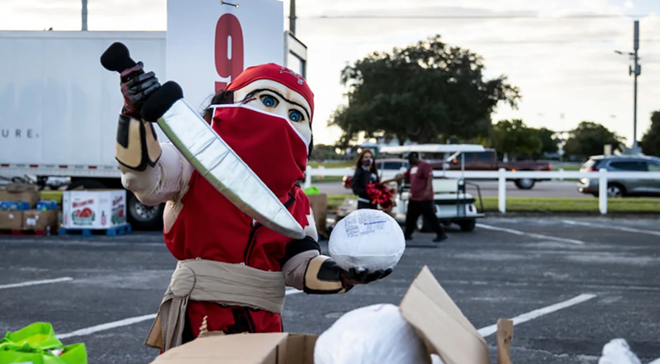Now that Tom Brady is a Buc and we will be the first team to play the Super Bowl on our home turf, pigskin-tossing buccaneers are everywhere.
Here in Tampa, though, that’s how it usually is. We are a town of buccaneers, whether it’s Sunday at RayJay or any weekend during Gasparilla season. And if you ask any Tampanian (Tampan? Tampeño?) on the street what a buccaneer is, they’ll likely say “a pirate.”
Well, not quite.
The roots of the word “buccaneer” actually come more from the mundane life than any swashbuckling adventures. Interestingly enough, at least to this Tampa foodie, buccaneers were originally producers of food. To be specific, barbecue and bacon.
Hey, pirates gotta eat.
“Buccaneer” comes from the French boucanier, which meant “one who hunts wild oxen.” It was used to describe indigenous inhabitants in the French-occupied Caribbean. These early buccaneers not only hunted but also cured the meat on a boucan, which is connected to our word “barbecue.” The French word “boucan” surreptitiously sounded like the English word “bacon,” forming a trio of associations—buccaneers, barbecue, and bacon, oh my!
The earliest definition of the word, from 1661, connects all these dots: a buccaneer is “one who dries and smokes flesh on a boucan after the manner of the Indians.” Even though this definition goes on to specifically mention “French hunters of St. Domingo” as buccaneers, there is evidence that the word spread widely in the Caribbean, including to Haiti and the cosmopolitan seaport of Havana. Then, within thirty years, a second meaning appears, the one most familiar to us in the Bay area: “A name given to piratical rovers who formerly infested the Spanish coasts in America.”
So how did these connoisseurs of bacon become pirates?
The first clue is evident in that earliest definition, that buccaneers were French hunters who dried and smoked meat “after the manner of the Indians.” Why would this particular indigenous practice be appropriated by French colonists? Because the cured barbecue and bacon had become an essential export for long sea voyages across the Atlantic.
You know who else needed cured meat for long sea voyages? Pirates. At some point, buccaneers went from just supplying to actually being “piratical rovers.”
But the plot thickens: these bacon-fueled pirates weren’t just anyone. Colonial politics were crucial to who was and who wasn’t a buccaneer. The French origin of the word, and its evolution into English, align those two powerhouses in the Caribbean, and they often teamed up against a third—and more powerful—player, Spain. The later definition confirms this dynamic, as the “piratical-rovers” specifically attacked Spanish coasts in America.
So, buccaneers were more likely to be named Jack Sparrow than (wait for it, Tampanians) Jose Gaspar. These French and English privateers raided Spanish-occupied territories and circulated their loot around Caribbean ports, all while feasting on their tasty smoked meats.
This year then, as you sit down to watch the game, celebrate in true historic fashion—with a huge plate of bacon. And go Bucs!
Support local journalism in these crazy days. Our small but mighty team is working tirelessly to bring you up to the minute news on how Coronavirus is affecting Tampa and surrounding areas. Please consider making a one time or monthly donation to help support our staff. Every little bit helps.
Want to know everything going on with Tampa Bay's food and drink scene? Sign up for our Bites newsletter.


